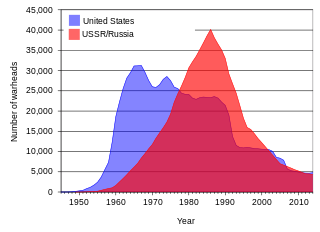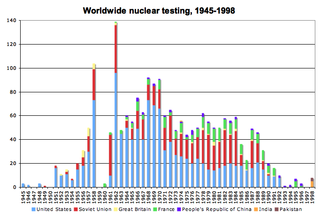
Nuclear disarmament is the act of reducing or eliminating nuclear weapons. Its end state can also be a nuclear-weapons-free world, in which nuclear weapons are completely eliminated. The term denuclearization is also used to describe the process leading to complete nuclear disarmament.
Arms control is a term for international restrictions upon the development, production, stockpiling, proliferation and usage of small arms, conventional weapons, and weapons of mass destruction. Historically, arms control may apply to melee weapons before the invention of firearm. Arms control is typically exercised through the use of diplomacy which seeks to impose such limitations upon consenting participants through international treaties and agreements, although it may also comprise efforts by a nation or group of nations to enforce limitations upon a non-consenting country.

The Bulletin of the Atomic Scientists is a nonprofit organization concerning science and global security issues resulting from accelerating technological advances that have negative consequences for humanity. The Bulletin publishes content at both a free-access website and a bi-monthly, nontechnical academic journal. The organization has been publishing continuously since 1945, when it was founded by Albert Einstein and former Manhattan Project scientists as the Bulletin of the Atomic Scientists of Chicago immediately following the atomic bombings of Hiroshima and Nagasaki. The organization is also the keeper of the symbolic Doomsday Clock, the time of which is announced each January.

The Pugwash Conferences on Science and World Affairs is an international organization that brings together scholars and public figures to work toward reducing the danger of armed conflict and to seek solutions to global security threats. It was founded in 1957 by Joseph Rotblat and Bertrand Russell in Pugwash, Nova Scotia, Canada, following the release of the Russell–Einstein Manifesto in 1955.
Bernard Taub Feld was a professor of physics at the Massachusetts Institute of Technology. He helped develop the atomic bomb, and later led an international movement among scientists to banish nuclear weapons.
William C. Potter is Sam Nunn and Richard Lugar Professor of Nonproliferation Studies and Founding Director of the James Martin Center for Nonproliferation Studies at the Middlebury Institute of International Studies at Monterey (MIIS). He also directs the MIIS Center for Russian and Eurasian Studies.

Jon Wolfsthal is an American national security consultant, government appointee, and columnist.

Team B was a competitive analysis exercise commissioned by the Central Intelligence Agency (CIA) to analyze threats the Soviet Union posed to the security of the United States. It was created, in part, due to a 1974 publication by Albert Wohlstetter, who accused the CIA of chronically underestimating Soviet military capability. Years of National Intelligence Estimates (NIE) that were later demonstrated to be very wrong were another motivating factor.
The Albert Einstein Peace Prize was a peace prize awarded annually since 1980 by the Albert Einstein Peace Prize Foundation. The Foundation dates from 1979, the centenary of the birth of Albert Einstein, and evokes the Russell–Einstein Manifesto which urges nuclear disarmament. It was established, with the sponsorship of the trustees of Einstein's estate, by William M. Swartz (1912–87) a wealthy businessman and the grandfather of activist Aaron Swartz. William M. Swartz was involved in the Pugwash Conferences on Science and World Affairs and established the Foundation in part to support Pugwash. Prize winners, mainly active in nuclear disarmament, receive(d) $50,000.

Jayantha Dhanapala was a Sri Lankan diplomat who served as member of the Board of Sponsors of The Bulletin of the Atomic Scientists and was a governing board member of the Stockholm International Peace Research Institute. Dhanapala was also a distinguished member of Constitutional Council of Sri Lanka and he was the Senior Special Advisor on Foreign Relations to President Maithripala Sirisena, and was Sri Lanka's official candidate for the post of Secretary-General of the United Nations, before withdrawing from the race on 29 September 2006. From 2007 he was the president of the Pugwash Conferences on Science and World Affairs.
Dr. Randall Caroline Forsberg led a lifetime of research and advocacy on ways to reduce the risk of war, minimize the burden of military spending, and promote democratic institutions. Her career started at the Stockholm International Peace Research Institute in 1968. In 1974 she moved to Cambridge, Massachusetts to found the Institute for Defense and Disarmament Studies (IDDS) as well as to launch the national Nuclear Weapons Freeze Campaign. Randall Forsberg was accompanied by an important colleague by the name of Helen Caldicott while she was leading the Nuclear freeze movement in both Manhattan and Central Park. Both women were met with many challenges in their efforts to lead the Nuclear Freeze Movement. These challenges included gender discrimination and discreditation as influential leaders by the media. Forsberg's strong leadership in the nuclear freeze movement is thought to be very influential in the writing of foreign policy during the Reagan administration and is even credited with catalyzing the negotiation of the INF treaty between President Reagan and Mikhail Gorbachev.

Gloria Charmian Duffy is a former U.S. Department of Defense official, businesswoman, social entrepreneur and nonprofit executive. Since 1996, she has been the president, CEO and a member of the Board of Governors of the Commonwealth Club of California, America's largest and oldest public forum, founded in 1903. From 2010 to 2017 she led the acquisition, financing, design, entitlements and construction of the club's first headquarters building, at 110 The Embarcadero in San Francisco. The grand opening for the club's new building took place on September 12, 2017. The building received a 2016 California Heritage Council award for historic preservation.
Council for a Livable World is a Washington, D.C.-based non-profit advocacy organization dedicated to eliminating the U.S. arsenal of nuclear weapons. Its stated aim is for "progressive national security policies and helping elect congressional candidates who support them." The Council was founded in 1962 as the Council for Abolishing War by Hungarian nuclear physicist Leó Szilárd. Its education and research arm, the Center for Arms Control and Non-Proliferation, provides research to members of Congress and their staff. In February 2016, John F. Tierney was appointed the executive director of the Council for a Livable World and the Center for Arms Control and Non-Proliferation. For more than 50 years, the Council for a Livable World has been advocating for a more principled approach to U.S. national security and foreign policy.
The International Luxembourg Forum on Preventing Nuclear Catastrophe — is an international non-governmental organisation uniting leading world-renowned experts on non-proliferation of nuclear weapons, materials and delivery vehicles.

The application of nuclear technology, both as a source of energy and as an instrument of war, has been controversial.

Catherine McArdle Kelleher was an American political scientist involved in national and international security policy. She was Senior Fellow at the Watson Institute for International Studies at Brown University and College Park Professor of Public Policy at the University of Maryland. Kelleher was the Director of the Aspen Institute in Berlin from 1998 to 2001 when she was appointed Professor of Strategy at the Naval War College (2001–2006). In the 1990s she was appointed Honorarprofessor at the Free University of Berlin, and she regularly taught at the Geneva Center for Security Policy in Switzerland for over a decade.
John Tirman was an American political theorist. From 2004, Tirman was executive director and principal research scientist at the MIT Center for International Studies. There he led the Persian Gulf Initiative, which conducted work on Iraq war mortality and U.S. and Iran relations, as well as other projects. He was the author or coauthor of 13 books on international affairs, many of them exploring and advocating the “human security” paradigm in global affairs, and was a frequent contributor to AlterNet, The Huffington Post, and The Boston Globe.
Thomas Graham Jr. is a former senior U.S. diplomat. Graham was involved in the negotiation of every single international arms control and non-proliferation agreement from 1970 to 1997. This includes the Strategic Arms Limitation Talks, the Strategic Arms Reduction Treaties, the Anti-ballistic missile (ABM) Treaty, Intermediate-Range Nuclear Forces Treaty (INF) Treaty, Treaty on the Non-Proliferation of Nuclear Weapons Treaty (NPT), Treaty on Conventional Armed Forces in Europe (CFE) Treaty and Comprehensive Nuclear-Test-Ban Treaty (CTBT). In 1993, Ambassador Graham served as acting director of the Arms Control and Disarmament Agency (ACDA) from January to November, 1993 and Acting Deputy Director from November, 1993 to July, 1994. From 1994 through 1997, he was president Bill Clinton's special representative for Arms Control, Non-Proliferation, and Disarmament. Graham successfully led the U.S. government efforts to achieve the permanent extension of the NPT in 1995. Graham also served for 15 years as the general counsel of ACDA. Throughout his career, Thomas Graham has worked with six U.S. Presidents including Presidents Richard Nixon, Gerald Ford, Jimmy Carter, Ronald Reagan, George H. W. Bush, and Bill Clinton. Ambassador Graham worked on the negotiation of the Chemical Weapons Convention and the Biological Weapons Convention and managed the Senate approval of the ratification of the Geneva Protocol banning the use of chemical and biological weapons in war, as well as the Biological Weapons Convention.
Milton Leitenberg is an American academic specializing in arms control and weapons of mass destruction. He is a senior research associate with the Center for International and Security Studies at Maryland (CISSM), a division within the School of Public Policy at the University of Maryland.

Rebecca Johnson is a British peace activist and expert on nuclear disarmament. She is the director and founder of Acronym Institute for Disarmament Diplomacy as well as a co-founding strategist and organiser of the International Campaign to Abolish Nuclear Weapons.









